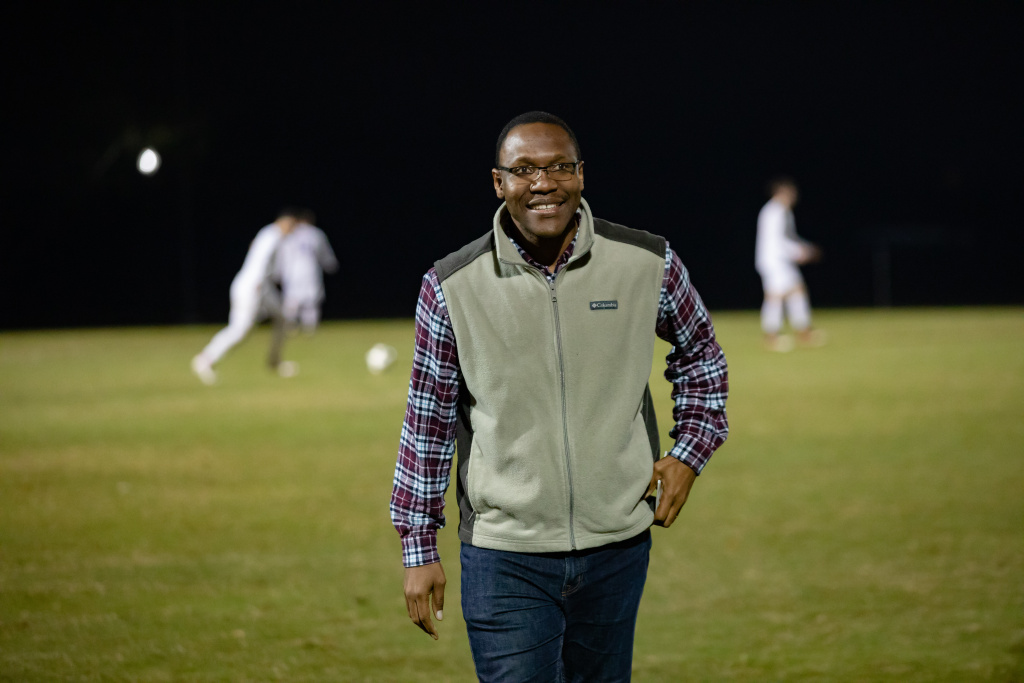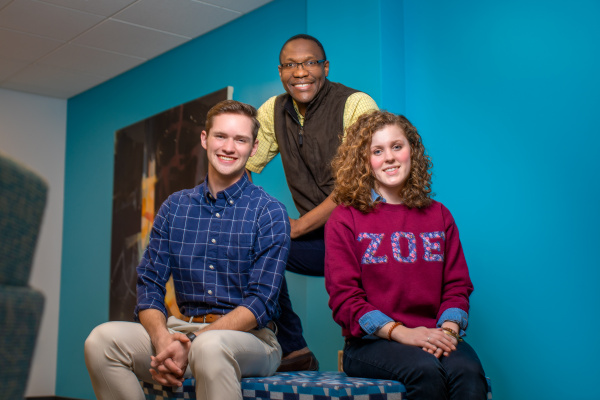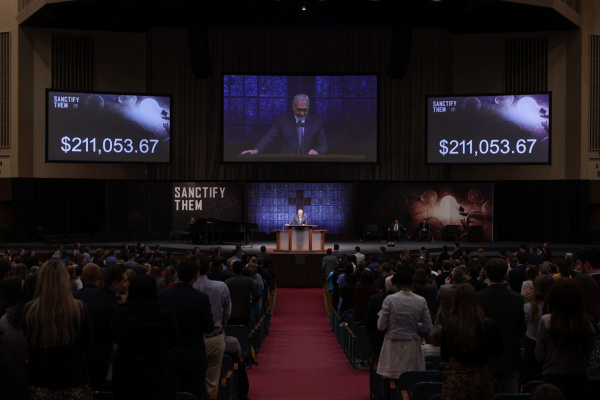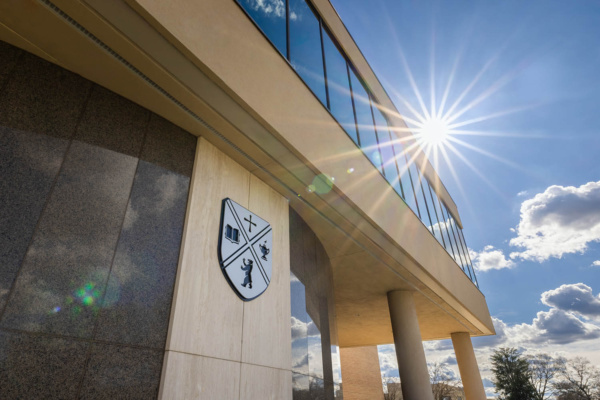Having trouble listening? Use this link instead.
This year’s Bob Jones University Bible Conference is approaching quickly. I’m excited to welcome several godly preachers to speak on the topic of “Sanctify Them” from John 17:17. This annual event is always the highlight of the semester, and I encourage you to join us via livestream.
I’m also very excited about this year’s Bible Conference fundraiser. The student body has thrown their support behind our effort to raise $200,000 for the Hope Christian Health Center in the Ivory Coast.
In today’s episode, I sit down with Dr. Bernard Kadio, who has dedicated much of his life to the success of the Hope Christian Health Center. He shares the amazing story of how God led him to BJU and how this fundraising project will change the lives of many people and spread the hope of the Gospel to those in need. Additionally, I chat with Carson Aaron — a student at BJU — about how students are working hard to reach our goal.
Please pray that God works mightily in the lives of our students and about how you can help us raise money for the Hope Christian Health Center.
TRANSCRIPT OF DR. KADIO INTERVIEW:
This transcript has been edited for ease of reading.
(Music)
Rumpf: Welcome to Highest Potential with Dr. Steve Pettit, a podcast that explores how Bob Jones University empowers individuals to reach their highest potential for God’s glory.
(Music)
Pettit: Welcome back to the campus of Bob Jones University. I’m Steve Pettit, the president here at Bob Jones University, and we’re sitting in my office, and we’re beginning a new episode of our podcast here on Highest Potential.
And so, we are in our fifth week here of school. Our students have come back since Christmas break, and next week we have one of the highlights of the year here on campus, and that is our annual Bible Conference. Our theme this year is from John 17:17, “Sanctify Them.” That was the prayer of the Lord Jesus Christ for his disciples, and that’s really our prayer for our student body and faculty and staff, that they would grow in the likeness of Jesus Christ.
We’re very excited about the speakers we have coming, Evangelist Will Galkin from Salt Lake City, Utah; Dr. Rand Hummel, who is the director of The Wilds of New England; Dr. Sam Horn, who is the president of Master’s University and Seminary; our own Dr. Alan Benson, who is Vice President for Student Development; and then we’re really thrilled this year to have Dr. Les Ollila, who has been a long-time mentor for many people. And on Thursday night of next week, we are going to give him a very special award, a lifetime achievement award for leadership, as he has influenced so many people.
And then of course, this year we have as we have every year, a Bible Conference offering, and our offerings are specifically for mission-type projects. And this year, we are so excited about the opportunity we have. Our goal is to raise $200,000 for the building of the Hope Christian Health Center in the Ivory Coast of West Africa. And this project really came because one of our professors, Dr. Bernard Kadio, who is a native of West Africa, who is teaching here on the faculty of Bob Jones University, shared with us his vision for this health center.
And so, we’re so glad to have Dr. Kadio with us here in my office to tell us the story about this offering. So, Doc, thanks for being here with us.
Kadio: Thank you. It’s good to be here.
Pettit: Well, we had you last semester when we were getting into the issues with COVID, and you are one of our resident experts here to help us through that especially because of your knowledge of global health.
But I think it would be really good to start out with a little background, your life story. So, tell us a little bit about where you grew up, where you’re from, and then tell us how you came to the saving knowledge of the Lord Jesus Christ.
Kadio: Well, thank you again, and it is a pleasure to be here.
Yes, I was born in the Ivory Coast – in French, we say Côte d’Ivoire. It’s on the western coast of Africa. And I came to the Lord at the age of 15 through the preaching and the teaching of one missionary from here, from Greenville, South Carolina.
Pettit: Wonderful.
Kadio: Absolutely, and what is amazing is that the Lord – I have received the grace from God to be the first in my family to come to know the Lord, and so, I’m a first-generation Christian. And over the years, the Lord has revealed Himself to me so much and in such a way that I was able to witness and win my entire family to the Lord.
Pettit: Wonderful!
So, where did you live in Ivory Coast?
Kadio: We are from a city right on the Atlantic coast. It is called Grand-Bassam, in French, Grand Bassam. Grand Bassam was the first city capital of the Ivory Coast.
Pettit: I see.
Kadio: It was the city capital of the country from 1883 to 1934, and then the city capital was moved to Bingerville and then moved to Abidjan which is the current city capital.
Pettit: Current capital. And where did you study? What university undergraduate did you go to?
Kadio: I went to the University of Cocody; that’s in Abidjan. And in our fine education system, after high school you go straight, if you decide to go to med school, you go straight to med school for eight years.
Pettit: I see.
Kadio: And when I was saved – as I said, I was saved at the age of 15, and the Lord clearly showed me that He wanted me to go to med school. And I said, “Lord, wow, that was a big move” because actually, my senior year in high school I lost my father, and I was wondering how I was going to go to med school. But the Lord has provided. I completed med school at the University of Cocody University, and then I was in scholarship to continue farther and farther into my education.
Pettit: So, you went from Ivory Coast, and one sideline – when did you meet your wife and when were you married?
Kadio: Yeah, I met my wife in med school actually, and I won her to the Lord, and we got married after completing my school.
Pettit: I see, OK. And then from Ivory Coast, where did you go?
Kadio: From Ivory Coast, it was — I worked with the Ivorian government for some years, and then I didn’t have peace because as I say, the Lord clearly showed me after my salvation that He wanted me to get involved in medical missions. So, when I was working with the government, I didn’t have peace and the Lord used some patients and some circumstances, actually, to show me clearly that He wanted me to get involved in medical missions.
So, after working with the Ivorian government, I was able to start a Christian clinic, actually, with the help of some missionaries from the U.S. And then, there I received the scholarship and went to Egypt where I did my master of public health degree in Egypt and in France.
Pettit: So, you got a master’s in Alexandria, Egypt?
Kadio: Yes.
Pettit: And how many years were you there?
Kadio: Two years.
Pettit: Two years. And then from there you went to France.
Kadio: From there I went to France where I worked at the center, what we call in French, le Centre national d’études spatiales, which would be the American equivalent of NASA.
Pettit: Oh wow.
Kadio: Yes, I mean it was a blessing from God. And I worked there and helped develop what we call the (unintelligible) program, which is kind of how we would use the space technology to everyday life to improve the life of the people. And I really enjoyed it, actually. But the Lord wanted me to work in medical missions, so I said, “Well guys, I’m moving forward.”
Pettit: So, were you doing medical missions work at that time?
Kadio: Yes, sir.
Pettit: Where were you doing it and what were you doing?
Kadio: Back in the Ivory Coast, our clinic, actually, and I have some very interesting numbers about that. The clinic that we were able to start was the first Christian clinic with an open declaration of missions to reach out to the people for the Lord through medical care. And the clinic was 10 times smaller than the government hospital in the area yet with seeing three times more patients.
Pettit: Wow.
Kadio: Yeah. And that was a blessing. And also, I was doing some travels, short-term medical mission trips, (unintelligible) and I’ve been to Kenya (unintelligible) and all over Africa. And then the Lord opened the door outside Africa, a lot in America, Asia.
Pettit: I see. Many different places. Do you have any idea about how many mission medical trips you’ve done?
Kadio: Well, not one number. In 2018, I travelled 33,000 miles …
Pettit: Wow.
Kadio: … which is 1.5 times the earth’s circumference.
Pettit: I see that. So, you continued on your work. And then tell us how you got – because I know you ended up in Canada.
Kadio: Yes.
Pettit: So, tell us about that.
Kadio: I received another scholarship because, actually, I wanted not only to do medicine, but this is the kind of vision that we are even using for the Hope Christian Health Center. I wanted to add to my education more knowledge on public health and on population health. Yes, I know how to treat people, I know how to address disease, but I wanted to be able to, instead of treating disease, go in the community and prevent disease.
So, after my master’s degree, I felt like I needed to know more, and I also wanted to be able to train, to teach the next generation of believers, of medical missionaries. So, I received another scholarship, and I went to Canada, the University of Ottawa, and this is where I do my PhD in population (unintelligible).
Pettit: Wow. OK. So, during that time you became a member of the World Health Organization?
Kadio: Exactly. I became a member of the World Health Organization and that was part of a scientific team that did the health care reform in 2012 in Beijing, China, and that was a task force to kind of redesign worldwide (unintelligible) health system.
Pettit: So, tell us how you got to Bob Jones.
Kadio: Actually, the Lord put this together. Looking back, the closer I look, the closer I say, the more I say that came directly from the Lord. It all started towards the end of 2018. And there was a team from Bob Jones coming to the Ivory Coast with Dr. Hicks and some students, and I had been training students from the U.S. and from Canada and from France and different countries since 2007, actually. But that team that came, their behavior, their attitude, their Christian testimony was different. And my wife and I thought there is something different about those students here. So, I wanted to kind of learn more about them because I was interested in seeing what kind of university would create such fine students, and I mean, they were there eight days and we saw 1,000 patients with 601 individuals making a profession of faith.
Pettit: Wow.
Kadio: So, I started looking online and I said, probably this is the student that I want to give training, probably the Lord showed me the next generation of medical missionaries, the next generation of MDs, nurses, of preachers, so I want to be part of that. So, from Ottawa I said, Well, probably my time here is done. I started looking online and I applied to Bob Jones and I was accepted, and I came.
Pettit: So, you’ve been here – this is your third year?
Kadio: My second year.
Pettit: Your second year. Your second year. So, let’s fast-forward up to where we are right now in the Bible Conference. Of course, a good portion of your time here has been during the COVID virus outbreak. And so, you have been a major part of our protocols here, and though we follow the CDC, and we have our own testing here on campus, we also have our own special health committee that really is our guiding for the week in and week out here that you’re a part of, and that’s very important. So, thank you very much for that.
Kadio: My pleasure.
Pettit: So, give us a little background to the project and tell us a little bit about the Hope Christian Health Center.
Kadio: Thank you. I said earlier that we started that Christian clinic, and we were 10 times smaller than the government hospital, yet we were seeing three times more patients. One group of patients that we had were the mothers and children. We call it technically MNCH – Mothers, Newborns, Children, Health. So, we would do the (unintelligible) for nine months, but because our clinic was so small, we know how to deliver a baby, but we didn’t have the facilities. So, after the nine-month (unintelligible), we would send them to the government to deliver the baby and then return to us for the (unintelligible). So, what we noticed when we’re doing our depth analysis was 70 to 75 percent of the women that we were sending to the government hospital to deliver were not coming back, and that was kind of curious, so we called the family and found out that when the women would go and deliver to the government hospital, they were dying – the mother would die or both of them would die. And to that point we said, that’s not good. We need to move from our clinic to a facility where we are able to deliver our own babies and with the correct (unintelligible). So, this is kind of the turning point that the Lord used for us to kind of shift from the clinic to actually a hospital where we will have a maternity ward where we will be able to take care of the patient in a comprehensive manner.
Pettit: So, the goal here is to raise the $200,000 and how would this building – and building this hospital would meet the need. How much bigger would it be than what you have now with the clinic?
Kadio: Well, the Lord has always provided. We have been working on this project for years, and the Lord has already provided not only some equipment, He has provided the land, He has provided even some funds to help, and what we are doing here, with the blessing that God is giving us, we should be able to have the mother, newborn and children pavilion ready.
Pettit: I see.
Kadio: And with that, our approach here is unique because actually, we will be the first hospital in the county to kind of shift from a disease focus to a health focus.
Pettit: I see.
Kadio: What we mean by that is that is we will not only deliver babies, we’ll not only provide medical care, but we will also complement with a health education segment whereby we will train mothers on subjects like nutrition, like prevention of disease. Instead of waiting for them to be sick and then have to treat them, the (unintelligible) a health education, a public health component, and we will be the only one in the country to bridge clinical care with preventative care.
Pettit: I see, I see. Well, that’s wonderful. And one of the things, and I know this is your burden because you said medical missions, so how will the gospel be spread though this project? What’s your vision?
Kadio: Thank you very much. We, the team – and we have some missionaries involved, we have some nurses involved – we have been praying and pleading with God to give us 10 percent of our patients to get to know Him. The Health Center, when it is finished, is expected in the first three years to see 15 thousand patients a year. With that, if we have 10 percent saved, that is one thousand five hundred people that will be saved though that ministry every year. And our plan is to have some ministries, some missionaries with us to start churches with those one thousand five hundred people.
Pettit: That’s your prospects.
Kadio: Exactly.
And we see that 10 years from now, we should be able to start at least actually ten churches with one church every year.
Pettit: I see.
Kadio: So, we are planning on connecting actually three countries on the African, West African coast – Ghana, Ivory Coast and Liberia. And we will be planting churches all along that line …
Pettit: All along the coast.
Kadio: …exactly, to the people that will be won to the Lord though the (unintelligible) ministry.
Pettit: The last time I preached in Liberia was in 2000.
Kadio: Wow.
Pettit: So, it’s been a long time.
Kadio: Wow.
Pettit: Well, I think that gives us a pretty good picture of our goal and so, Dr. Kadio, thank you so much for sharing your testimony and the vision. And let me say to all of you that are listening, I think it’s probably clear that it’s not really possible for our student body just alone to come up with $200,000. And so, we already have some seed money that has been put out of $50,000, and I would encourage all of you that are listening to consider giving. You can give online to bibleconference.bju.edu/offering, and you can actually – all of our offerings this year are through the online. We’re not passing any plates, and so you can be part of the medical missions, you can be a part of the hospital. If you give a certain amount of money, we’re actually putting names on plaques that will be posted up in the health center there in the Ivory Coast, and so, I hope that you’ll pray about this, and I hope that you’ll consider giving to the Bible Conference offering for the Hope Christian Health Center in Ivory Coast, West Africa.
Thank you, Dr. Kadio, thank you very much.
Kadio: Thank you for having me.
(Music)T
Pettit: Well, we have a little bonus here for this broadcast that we had with Dr. Kadio.
We have here one of our students, Mr. Carson Aaron. Carson, how are you doing?
Aaron: I’m doing well, sir.
Pettit: Tell us where you’re from.
Aaron: I’m from the little town of Quitman, Arkansas.
Pettit: Quitman, Arkansas.
So, regarding this offering for the health center in Ivory Coast, tell us how you’re personally connected to this project.
Aaron: Yeah, so in 2004 my dad took a trip with a dentist from my church in Arkansas, and they went on a medical missions trip. My dad is not medically trained but he went over there to help to the Ivory Coast. And he came back talking about this guy called Kabe, which you’ve got to ask Dr. Kadio about it, but it’s something about in the Ivory Coast, you take the first and the last. the first letters of the first and last names, switch it, and you get Kabe.
So, he came back talking about Dr. Kabe, and he ended up coming to my church shortly after, so I’ve known him most of my childhood.
Pettit: OK.
Tell us a little bit about how you and your society had gotten involved in this project.
Aaron: Yeah, so I’m in Basilean, and me and my society president were talking early – late last semester about how we’d like to help because this was something that we really believed in. And we had the idea of maybe film a video of Dr. Kadio telling a little bit of the story that we could share on social media to churches back home and just kind of get the word out that way. And I talked to Dr. Weathers about it, and he was excited about it, and he said, “Well, there’s another girl, her name is Elise Snow, she’s with the society Zoe, and they’ve got an idea similar. So, the idea you mentioned of putting your names on a plaque, that actually came from the girls’ society. So, that’s at the end of that video too. So, we got together, had some guys in my society that know a lot about cameras …
Pettit: Sure, got our film stars here.
Aaron: And they did a wonderful job. Blew us away.
Pettit: So, that video is online at today.bju.edu. I know it’s on my Twitter feed, it’s probably on the BJU Facebook account, so we encourage people to go and watch that.
One last question, and of course you’re representing the student body here, but tell us how you feel like why it is that the students have gotten behind this project.
Aaron: Yeah, that’s one thing that I’d love to see. This Bible Conference and the last Bible Conference with Save the Storks is that my generation – it almost seems like they don’t care about a lot of things sometimes. And looking at it, especially from certain perspectives, it looks that way. But then some things, it just lights a fire under them, and that’s what’s really happened the past couple of years. And what I love about my generation is that we love to get behind things that we believe in. And so, you add the element of Christianity and the power of the Gospel into it, and you’ve really got a fire that’s hard to put out on campus. It’s pretty great to watch.
Pettit: Yeah, this one was kind of, I think, a little bit slower pickup speed, maybe because of just the way we were able to promote it. And then when they realized that they could build a real hospital and that many people could get saved, and it’s through one of our own professors …
Aaron: Yeah.
Pettit: … Dr. Kadio. Well, I appreciate you telling me that, and let me just encourage all the listeners once again, we really do need everyone’s help in this offering. Our students are committed by faith to raise $200,000. I can tell you right now they can’t squeeze it out of our student body, but they are stepping out by faith and so, would you partner with us and consider giving to the goal of $200,000 to raise money for the Hope Christian Health Center in the Ivory Coast in west Africa. And you can go online to bibleconference.bju.edu/offering and give a gift there. All the gifts will be brought in through our online; there will be no offerings taken during the Bible Conference. It will be all online. So, I hope you’ll give and support the work of God.
(Music)
Rumpf: Thanks for listening to this week’s episode of Highest Potential with Steve Pettit. Don’t forget to find us and subscribe on Apple podcast, Spotify or wherever you get your podcast. Thanks again for listening. We’ll talk to you next week.








